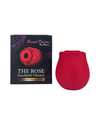You can use lube (personal lubricant) to make sexual acts more enjoyable, like sex, masturbation, and sex toys. By reducing friction between your skin and the person, object, or body part you're using, lubes can stop chafing, painful rubbing, and discomfort.
What's the point of lube?

It's okay to use lube! It's nothing to be ashamed of—it adds a lot to your sexual experience. Don't be ashamed to use lube. It's not uncommon for women who produce plenty of vaginal fluids to use a lube to make themselves more enjoyable.
After menopause, the genitourinary area (including the vagina and vulva) may change and atrophy due to the decrease in estrogen levels. About half of postmenopausal women feel dry and uncomfortable when having sex (1,2). When estrogen levels drop, these tissues get thinner, less flexible, get less blood flow, and produce less vaginal fluid. Using a lubricant helps reduce the discomfort of sex when experiencing vaginal dryness, but it doesn't fix the underlying problem.
Occasionally, people may experience vaginal dryness which can cause discomfort or pain during intercourse. In addition to breastfeeding, taking medications (including antihistamines and antidepressants), breast cancer survivors, and individuals with Sjogren's syndrome may also experience vaginal dryness (2). A lubricant may be beneficial in these situations.
Your body produces lubricants

As part of your cycle, your body produces many fluids that can act as lubricants. Some of these include:
- Menstral, At the beginning of your cycle, you can use menstrual blood as a lubricant for masturbation or sex.
- Cervical fluid, If you have cervical fluid around the time of ovulation, you will have a slipperier glide (just remember that heterosexual sex around the time of ovulation has the highest probability of causing pregnancy).
- Vaginal and arousal fluid, Make sure you allow sufficient time for foreplay to allow your arousal pathway to produce sufficient fluids to moisturize and lubricate your vagina.
- Saliva, In addition to serving as a lubricant, saliva can also act as a protective measure against vulvovaginal candida. In addition to saliva's protective bacteria and antifungal properties, researchers believe that the lack of immunity to your own fluids could be responsible for this. Compared to receiving cunnilingus (oral sex on the vulva), receiving cunnilingus may increase your chances of contracting candida (3).
What to look for when choosing a lubricant

You should begin by using water-based lube. It can be used for penetrative sex, masturbation, and sex toy play. It is also ideal for those with sensitive skin or vaginal irritation and can be used with condoms and sex toys. Furthermore, water-based lubes are very easy to remove from sheets and clothes, and they do not leave any stains.
The downside of water-based lubes is that they are not suitable for water play/shower sex, as they will simply wash away. Also, water-based lubes are sticky and require frequent reapplication. We may suggest another type of lubrication if you plan to have marathon sex.
As silicone-based lubricants are slippery, long-lasting, and ideal for longer sessions, they require less application of lube and require less reapplication. Silicone-based lubes are also ideal for shower sex or masturbation in the shower, as they do not wash away so easily. However, silicone-based lubes are more difficult to remove, since you will need soap and water to remove them. In addition, silicone-based lubes can stain sheets. (A word of caution: do not spill silicone-based lube on hardwood floors, as it will stain them and leave them slightly slippery for a prolonged period of time.)
In order to prevent silicone-based sex toys from breaking down over time, silicone-based lubricants should not be used. However, this does not mean all sex toys are off limits with silicone-based lubricants—there are many toys made from other materials, including hard plastics, glass, and steel.
These lubes are ideal for masturbation (hands or toys), penetrative unprotected sex, and water-play. They can also be used for sensual massage.
Latex condoms should not be used with oil-based lubes (or any other oil-based products like petroleum jelly or mineral oil), as they may dissolve the latex of the condom or cause it to break. It is also important to avoid using oil-based lubricants on latex diaphragms and latex sex toys. Non-latex condoms (such as those made of polyisoprene) can also react to oil-based personal lubricants, so check the package before using (5).
Oil-based lubes have the disadvantage of being more difficult to remove from sheets and from your body.
Lubes for anal sex

Since the anal canal does not produce fluids to facilitate penetration, personal lubrication is highly recommended. Additionally, the tight muscular sphincter at the anus' entrance provides much more resistance than the vagina, which is full of folds and stretchable tissues.
Additionally, the use of a personal lubricant can improve the safety of anal sex. Contrary to oil-based lubricants or saliva, which both increase the likelihood of condom breakage during anal sex, using water-based lubricant decreases the chances of condom breakage while having anal sex. Also related to lubrication is the likelihood that the condom will slide off during anal sex. When lubrication is applied to the outside of a condom, it can decrease the likelihood of slippage, whereas when it is applied to the inside, it can increase the likelihood of slippage (6).
Good to know before you buy
You should avoid any lubricant containing artificial flavors, colors, sugars, essential oils, additional additives, or glycerine because you may not know how you will react to these additives. It can be overwhelming if you are using a personal lubricant for the first time—some of these additional features can be overwhelming. It is also important to note that a natural product does not necessarily mean it is better for you just because it is natural. Read the ingredients list, read product reviews, or ask an expert in a sex toy shop.
It is still unclear whether there is a link between glycerin/glycerol containing lubricants and the health of your vaginal bacteria. Glycerin is a sugar alcohol that can sometimes be used in lubricants. There are some studies suggesting glycerin-containing lubricants increase the risk of vaginal infections, while others indicate glycerin does not affect vaginal microflora at all (7,8). Additional research is necessary.
There are times when glycerols (and similar compounds) are used in lubricants to provide special properties, such as warming sensations or extra slippage (5). By causing damage and dehydration to anal and vaginal tissues, lubes with high concentrations of glycerols can actually adversely affect these tissues. Furthermore, this tissue damage can increase the risk of transmission of sexually transmitted infections (5), as well as being uncomfortable.
To prevent an increased risk of bacterial vaginosis, choose water-based lube that reflects the acidity of a healthy vagina (4). As the anus has a neutral acidity level (pH 5.5 to 7), be sure to choose a lubricant appropriately here as well.
However, some lubricants may also contain spermicide chemicals, which may cause irritation to the vagina. Therefore, these are not recommended for use. When trying to conceive, it is important to use lubricant that is designed specifically for conception, since some lubricants may decrease sperm motility.
Check out all of our lubricants HERE




